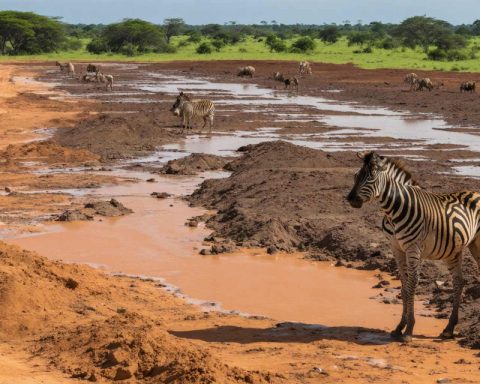- Vast African landscapes face threats from oil drilling, mining, and dam construction, endangering biodiversity.
- Uganda sees oil exploration in elephant habitats, while Guinea’s rainforests suffer due to iron and bauxite mining.
- Côte d’Ivoire’s proposed dams could disrupt ecosystems, mirroring global environmental challenges.
- Despite laws against environmental destruction, economic interests often overshadow preservation efforts.
- Between 7.5% and 13% of species face extinction due to human activities linked to resource extraction.
- Sustainable solutions are crucial for balancing ecological preservation with economic development in Africa.
- The future hinges on innovative strategies that sustain both humanity and Earth’s natural cradle.
Vast savannas stretch beneath the golden sun, home to elephants, lions, and irreplaceable ecosystems. Yet, beneath the verdant canopy of Africa’s cherished landscapes lies an inconvenient truth. In Uganda, where elephants roam with majestic grace, oil drills puncture the earth in a quest for black gold. Across the continent in Guinea, thriving rainforests shiver under the impending destruction of burgeoning iron and bauxite mines. Meanwhile, in Côte d’Ivoire, plans for new dams threaten to erode the delicate tapestry of biodiversity.
These landscapes, teeming with life, mirror the urgent warning signs of our warming planet. Humanity’s relentless pursuit of resources echoes like a siren call, overshadowing the loss of between 7.5% and 13% of species—from plant to animal—owing to our own actions.
Ironically, on paper, these acts of destruction are deemed unacceptable, outlawed in numerous accords and regulations. Yet, the allure of economic gain often blinds decision-makers to the incalculable value of these natural wonders, steering them towards choices that prioritize short-term profits over long-term preservation.
This brewing storm over Africa’s sprawling lands underlines an all-too-clear message: economic progress should not come at the expense of nature’s rich bounty. As nations grapple with the realities of climate change, it becomes imperative to find a balance that supports human development without devastating the ecosystems that sustain all life.
The next chapter of humanity’s story will be defined by whether we can innovate sustainable solutions that both unlock the treasures of the earth and preserve their cradle. As the clock ticks, the world watches, hoping for a resolution that acknowledges that the wealth of nations is bound to the well-being of our planet.
The Untold Battle for Africa’s Natural Wealth: A Clash of Conservation and Development
The Real Cost of Resource Extraction in Africa
Africa’s vast savannas and rainforests are the stage for a complex interplay between economic development and environmental preservation. The extraction of resources like oil in Uganda, iron and bauxite in Guinea, and the construction of dams in Côte d’Ivoire illustrate the tension between short-term economic interests and long-term ecological health. Here, we delve into deeper insights and actionable recommendations for addressing these challenges.
Real-World Use Cases
1. Resource Extraction Impact on Local Communities:
The extraction of resources often promises job creation and economic growth but can also lead to social disruptions, displacement, and loss of livelihoods for communities dependent on natural ecosystems (World Bank).
2. Biodiversity and Ecosystem Services:
Healthy ecosystems provide services such as water purification, climate regulation, and food security. The loss of species and habitats can thus exacerbate poverty and food insecurity (UNEP).
Market Forecasts & Industry Trends
– Growth in Resource Extraction:
The African mining and energy sectors are projected to expand, driven by global demand for minerals and energy resources. According to PwC, Africa’s mining industry is expected to grow by 3% annually, yet there is an increasing pressure to balance this with sustainable practices.
– Renewable Energy Development:
There is a growing trend towards renewable energy projects, which could counterbalance the environmental impact of fossil fuels and large-scale industrial activities. Africa has substantial solar and wind energy potential, offering a path to sustainable development.
Controversies & Limitations
– Environmental Regulations:
Existing accords and regulations are often not enforced effectively. Corruption can undermine conservation efforts, leading to illegal logging, poaching, and unsustainable resource extraction (Transparency International).
– Balancing Growth and Conservation:
Critics argue that development projects often overlook the environmental costs. There is a pressing need for integrated policies that consider ecological impacts alongside economic benefits (WWF).
Security & Sustainability
– Impact on Climate Change:
Deforestation and industrial activities contribute to greenhouse gas emissions. Transitioning to sustainable practices is crucial for mitigating climate change impacts (IPCC).
– Sustainable Practices:
Solutions include adopting green technologies, improving resource efficiency, and investing in restoration projects. Companies and governments should collaborate to implement sustainable land management practices (Conservation International).
Actionable Recommendations
1. Invest in Renewable Energy:
Encourage investments in Africa’s abundant solar and wind resources as alternatives to fossil fuels.
2. Strengthen Environmental Governance:
Enhance enforcement of environmental regulations and increase transparency in decision-making processes.
3. Promote Eco-Tourism:
Develop sustainable tourism initiatives that support local economies while preserving ecosystems.
4. Community Engagement:
Empower local communities to manage their natural resources by involving them in planning and decision-making processes.
5. International Collaboration:
Leverage global partnerships to fund conservation projects and share technology innovations for sustainable practices.
By adopting these strategies, Africa can chart a path towards harmonious development, ensuring that economic progress does not come at the cost of its invaluable natural heritage.
For more insights on sustainable development and conservation efforts, visit World Bank, UNEP, and WWF.








